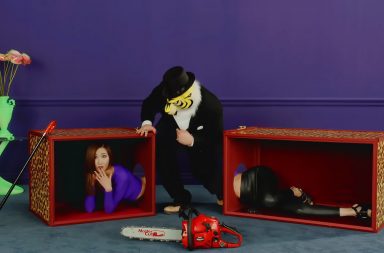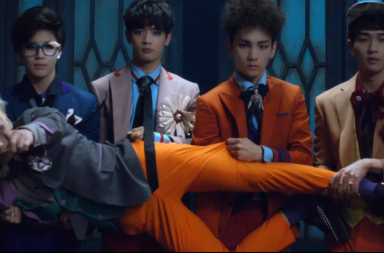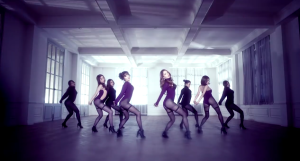 Recently, after girl group STELLAR received an onslaught of criticism and controversy for their oddly unstimulating video for “Marionette,” the Korean Communications Standards Commission (KCSC) started to take a hard look at weekly idol shows (more specifically, Inkigayo, Music Bank, and Show! Music Core). Their goal: forcing networks to take action against girl groups utilizing sexier concepts for their latest promotions.
Recently, after girl group STELLAR received an onslaught of criticism and controversy for their oddly unstimulating video for “Marionette,” the Korean Communications Standards Commission (KCSC) started to take a hard look at weekly idol shows (more specifically, Inkigayo, Music Bank, and Show! Music Core). Their goal: forcing networks to take action against girl groups utilizing sexier concepts for their latest promotions.
The actual language of the original Naver article is fascinating: “The KCSC has strongly emphasized that the girl groups’ level of exposure is too much and that tighter regulations and restrictions need to be made.” What’s intriguing is how strongly worded the KCSC is regarding the female groups, with no actual mention of male groups or artists at all. While there was a loose mention of music shows “inspecting each group, sometimes asking groups to change their outfits or choreography or even banning some groups from broadcast in the past”—a topic that’s been brought up before—it’s clear that this governing body over public decency has decided the female groups are to be made an example of for something that a) they probably have no control over, and b) their male peers very rarely get penalized for. Even more fascinating is that nowhere in this article or any other article discussing this topic in the past has there ever been mention of penalizing record companies for their oftentimes lewd representation of their female stars. The groups themselves take both the criticism and the punishment while the record companies issue half-baked apologies to netizens and viewers, oftentimes cancelling promotions for groups that are heavily criticized.
[youtube http://youtu.be/0Ffo9nrwFIY]In its own words, the KCSC’s definition of obscenity includes forms of media that promote lewd information, child trafficking/prostitution, obscene broadcasting for adults, and child pornography. It goes further to define anything that constitutes grounds for filing a report: “Harmful information from the internet in a broad sense, and, to be concrete, immoral, violent, obscene, speculative and antisocial information….” If the sexual proclivities of the younger generation is really what’s being policed here, then why hasn’t the KCSC tackled the problem so vehemently before? And why just the female artists and groups that have cropped up as of late? What of their male counterparts, whose fundamental goal is to stimulate female fans into a frenzy in hopes that said young girls will follow them forever (or until their military duty comes calling)?
There isn’t a distinction between men and women on the KSCS’s website, nor is there any language suggesting that a woman’s behavior is considered a greater harbinger of lewd conduct, worth more scrutiny and public policing. What’s really at stake here has nothing to do with safeguarding young minds from corruption. What we have here is a fight over who can control a woman’s representation of her body and how. Are we to assume that a female’s sexuality is only valid when used as a prop to enhance the sexual desirability of male idol groups and feed the imagination of fangirls desperate for “oppa’s” affection?
[youtube http://youtu.be/1nNO_59j6QE]This sudden urge to “crack down” on this sexy representation of female idols may be a direct consequence of President Park Geun-hye’s administration attempting government transparency in lieu of actual freedom of expression. As South Korea’s first female president, President Park has already faced criticism based mostly on her pedigree. She has an opportunity to show she’s serious about changing Korea’s cultural landscape by taking record companies to task for their flagrant misogyny and blatant oversexualization of their female artists. She literally holds a substantial percentage of the entertainment industry in her hands. According to a progress report drafted by the Open Government Partnership and subsequently made public for comment, “Two out of three of the largest broadcasters are majority or partially owned by the government, raising concerns over how it exercises media influence.”
It’s obvious that broadcast companies are constantly under pressure to adhere to a set of standards put in place by their government. However, if this were simply a matter of attempting to rein in the amount of sexual images thrown at the public, this wouldn’t even be a topic of discussion. If, in fact, the KCSC’s aim is to protect younger artists, allowing them to come into their own sexuality and understanding of their sexual selves without the forced “aid” of their record companies, well good on ye, mate! There are quite a few K-pop fans who’d be first in line for that rally.
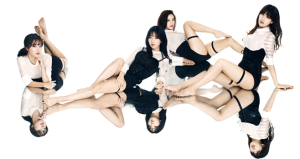 But that’s not at all the issue the KCSC has decided to take on. Instead of holding record companies accountable for sexualizing and ultimately fetishizing younger artists, they’re throwing a hissy fit over the amount of skin and “sensual” images women project. That’s where their concern for this new “sexy trend” begins and ends. Quite frankly, sex sells, and the amount of controversy aroused only feeds the fire, adding merit to the entire concept of using female sexuality to gain both popularity and revenue, if Top Class Entertainment’s and Stellar’s official sites crashing is any indication. But the KCSC isn’t particularly concerned with the fact that in a male-dominated industry, these women are essentially used as animated sex dolls to garner this type of reaction.
But that’s not at all the issue the KCSC has decided to take on. Instead of holding record companies accountable for sexualizing and ultimately fetishizing younger artists, they’re throwing a hissy fit over the amount of skin and “sensual” images women project. That’s where their concern for this new “sexy trend” begins and ends. Quite frankly, sex sells, and the amount of controversy aroused only feeds the fire, adding merit to the entire concept of using female sexuality to gain both popularity and revenue, if Top Class Entertainment’s and Stellar’s official sites crashing is any indication. But the KCSC isn’t particularly concerned with the fact that in a male-dominated industry, these women are essentially used as animated sex dolls to garner this type of reaction.
It’s pretty much accepted that a vast majority of modern society stems from a patriarchal perspective. Women are expected to be submissive and obedient in a society that tells them they are essentially the property of their men—from their fathers to their husbands to their supervisors, and yes, their record company managers and CEOs. Once that norm is challenged, there’s a sudden outcry that things are getting out of hand. Cue propaganda masquerading as protecting the moral fabric of society. It’s really nothing more than impetus for someone to decide what a woman’s body is to a man’s desires, a means to effectively “put a woman in her place.”
Recently, Ga-in has fought against this female archetype, imbuing K-pop with just the slightest bit of feminism. If nothing else, she’s given audiences a visceral, unapologetic peek into how women ought to own their sexuality, as well as voice their disillusion with roles they’re forced to play, situations they have no control over, and relationships they want to get out of. She’s stirred up her own bit of controversy because she’s chosen to be so brazen, but she’s quite literally said “Fxxk you” to the idea that she should play it safe and has fearlessly taken the piss out of an industry that thrives on turning women into objects of both affection and ridicule.
[youtube http://youtu.be/VSAVsstaj4E]In most cases this allegedly risqué behavior is nothing more than exposing a bit of leg and wiggling about on stage. The images we see on these music shows are really just projections of the male ego, a glimpse at who’s really pulling the strings when it comes to these female concepts. Let’s just call it what it is. The KSCS’s real concern is women expressing their sexual selves and upsetting the societal patriarchy. This isn’t a war on the oversexualization of females in pop culture. This is an attempt to stifle a woman’s sexual autonomy.
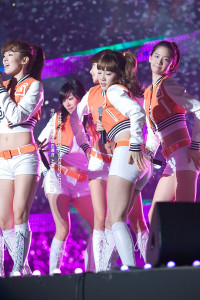 Ultimately all this overblown puffery about girls getting a little too sexy is a product of the contradiction between the pseudo-virginal imagery inherent in lionizing the female body and the idea that a woman must suit a certain level of both desirability and domesticity indicative of what a husband would expect of his wife. That any other human being has the authority to “crack down” on female representation in and of itself is not only presumptuous, it’s insulting. All it ultimately succeeds in doing is adding vitriol to an already poisonous aspect of K-pop fandom—slut-shaming, hypocritical acceptance of overt male sexuality, and tension between female fans and female idols.
Ultimately all this overblown puffery about girls getting a little too sexy is a product of the contradiction between the pseudo-virginal imagery inherent in lionizing the female body and the idea that a woman must suit a certain level of both desirability and domesticity indicative of what a husband would expect of his wife. That any other human being has the authority to “crack down” on female representation in and of itself is not only presumptuous, it’s insulting. All it ultimately succeeds in doing is adding vitriol to an already poisonous aspect of K-pop fandom—slut-shaming, hypocritical acceptance of overt male sexuality, and tension between female fans and female idols.
While K-pop in and of itself is certainly not the world’s leading proponent of sexual liberation, it is a microcosm of the ideology upheld in modern society, as with pop culture in any country. What continues to be a sensitive subject in K-pop is its outright misogyny. Even in an industry as fickle as entertainment, one trend remains evergreen: the male perspective is law and must be adhered to. It’s hard to buy the KCSC’s sudden call for censorship when the constant focus is how to force women to atone for their representation in the media. There’s nothing wrong with calling a record company’s ploy for popularity into question, but it becomes nothing more than blatant hypocrisy when the female is punished for carrying out her company’s wishes.
(KCSC, Naver, YouTube[1][2][3], Open Government Partnership, The Grand Narrative, MTVK)

